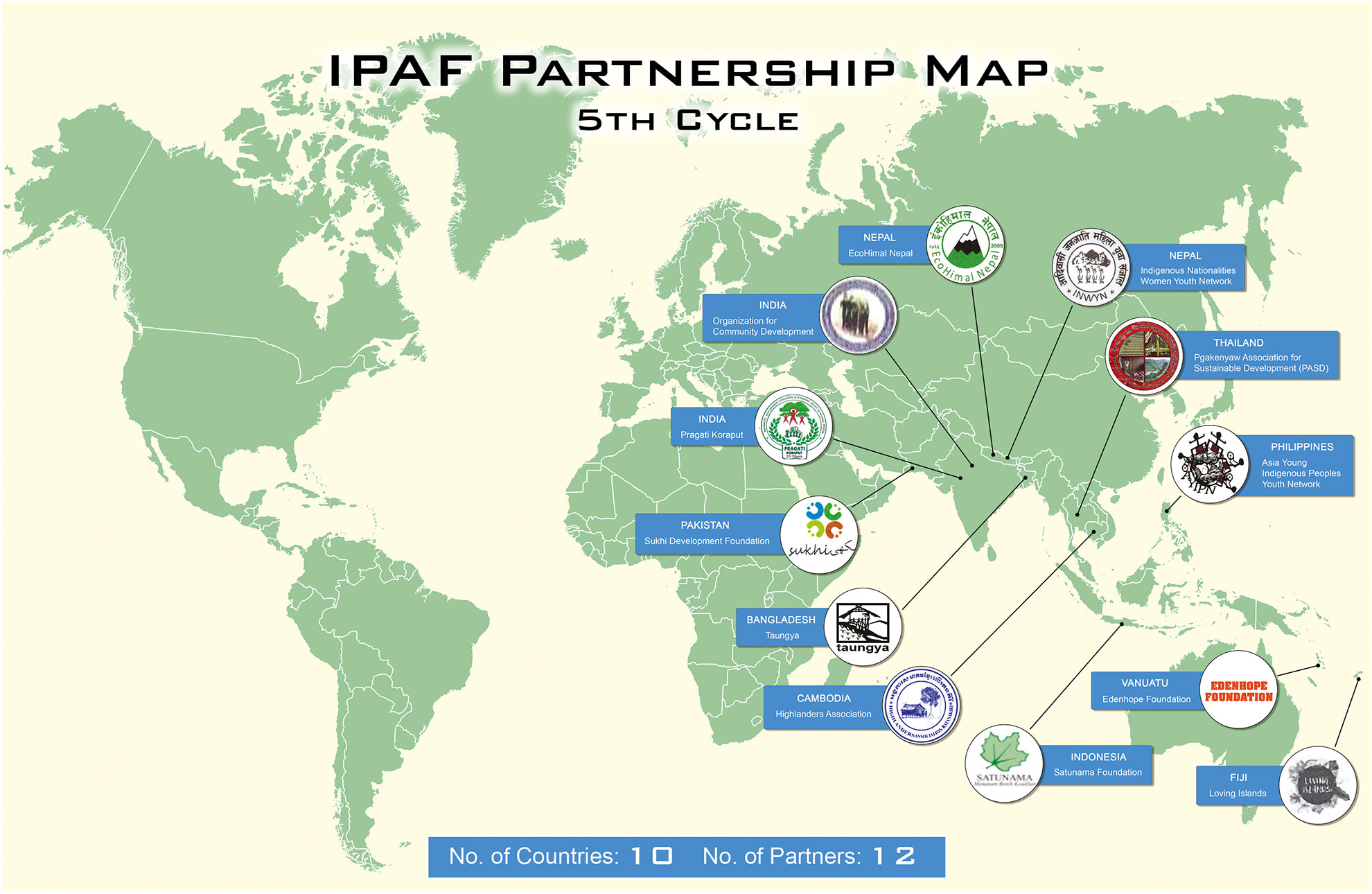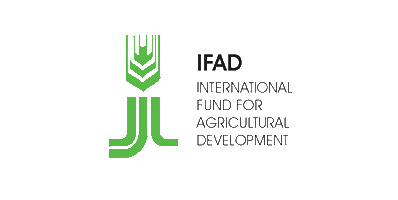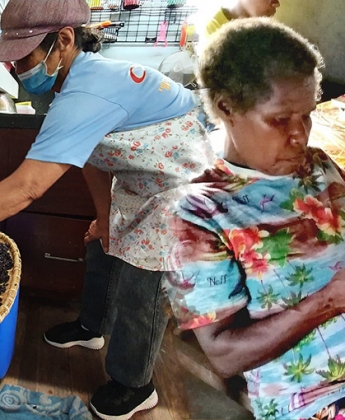Indigenous Peoples Assistance Facility (IPAF) - Asia Pacific (5th Cycle - 2018 - 2021)
The Indigenous Peoples Assistance Facility (IPAF), established at the International Fund for Agricultural Development (IFAD) in 2006, is an innovative funding instrument that indigenous peoples’ communities and organizations can access to support their self-driven development initiatives and help address their challenges. It is one of the mechanisms in realizing the United Nations Declaration on the Rights of Indigenous Peoples and the IFAD Policy on Engagement with Indigenous Peoples. The facility funds small development initiatives that build on indigenous peoples’ culture, identity, knowledge, livelihood activities, natural resources, and rights. In Asia and the Pacific, Tebtebba is the regional indigenous peoples organization that co-manage and coordinate the facility since 2011 up to the current 5th cycle.
In 2018, the IPAF launched its 5th Call for Proposals with specific focus on indigenous youth in four thematic areas: land, territories and resources; food security and nutrition; access to markets; and climate change mitigation and adaptation. In 2019, twelve (12) proposals from 10 countries in Asia and the Pacific were approved for funding via a competitive process. The project inception workshop conducted in August 2019 provided project partners an orientation on indigenous peoples’ self-determined and sustainable development (IPSSDD) as an overarching framework adopted for the IPAF projects. The inception workshop resulted to the levelling off on project implementation and monitoring processes, sharing of projects’ contexts and strategies, and signing of the partnership agreements between Tebtebba and the implementing organizations.
Country | Implementing Organization | Title of Project | Project Area of Support | Budget |
|---|---|---|---|---|
Bangladesh | Taungya | Develop Role Model of Hill Water Resource and Natural Forests Conservation of Ethnic Communities through Youth Engagement | Climate change | $ 48,267 |
Cambodia | Highlanders Association | Indigenous Peoples’ Rights to Food through Conservation of Indigenous Crops and Promotion of Traditional Farm Practice in Ratanakiri | Land, territories, resources; Climate change; Food security/ nutrition | $ 48,440 |
Fiji | Loving Islands | Loving Islands Farmer Enterprise (LIFE) | Food security / nutrition; Land, territories, resources; Access to markets; Climate change | $ 47,277 |
India | Organization for Community Development | Economic Empowerment of Young Women of the Indigenous Mukkuvar Community through a Traditional Sea Foods and Handicrafts Cooperative in Coastal Kanyakumari District, Tamilnadu State, India | Access to markets | $ 26,000 |
India | Pragati Koraput | Empowering Tribal Youth for Nutritional Food Security and Income Enhancement in Koraput District of South Odisha | Food security/nutrition | $ 41,651 |
Indonesia | Satunama Foundation | Local Value Strengthening in Village and Indigenous Forest Community Based Management in Merangin Distric, Jambi, Indonesia | Land, territories, resources | $ 38,320 |
Nepal | Ecohimal | Environment Conservation through Indigenous Community Empowerment | Climate change | $ 38,698 |
Nepal | Indigenous Nationalities Women Youth Network | Indigenous Youth Empowerment and Creating, Income-Generating Project (IYE-CIGP) | Land, territories, resources; Access to markets; Climate change | $ 48,440 |
Pakistan | Sukhi Development Foundation | Empowering Bakarwal Youth through Livelihood Diversification and Social Integration in Neelum valley, AJK-Pakistan | Food security/ nutrition; Access to markets; Land territories, resources | $ 46,086 |
Philippines | Asia Young Indigenous Peoples Network | Dap-ayan Village: Intergenerational Learning of Indigenous Knowledge by Doing | Land, territories, resources | $ 48,440 |
Thailand | Pgakenyaw Association for Sustainable Development | Youth for Nutrition Sensitive Indigenous Food Systems | Land, territories, resources; Access to markets, Food security/nutrition; Climate change | $ 48,440 |
Vanuatu | Edenhope Foundation | Empowering Indigenous Youth and Women in Biodiversity Management and Sustainable Livelihood for Communities in the Santo Mountain Chain | Access to markets; Land, territories, resources | $ 48,295 |
IPAF 5th Cycle in Asia-Pacific: Significant Changes, Challenges and Success Stories
IPAF 5th Cycle Video Documentaries
Project 2326 Satunama Video (Indonesia)
Through this project, the Orang Bathin and Orang Pengulu in 4 villages in Merangin, Jambi, Indonesia developed their Forest Management Plans and created regulations to protect and preserve their customary forests. Also, the project facilitated the submission of Decree on Customary Forest of Bukit Mujo in Tiaro village as a step to access “Customary Forest Status”. With the recognition of the customary forest status, the community in Tiaro Village will have the management rights to 39.5 hectares of its customary forest.
Project 1948 PASD Video (Thailand)
The project implemented by Pgakenyaw Association for Sustainable Development (PASD) aimed to strengthen local indigenous food systems significantly contributing to improved nutrition, food security, and income. Various project activities supported the production and consumption of healthy indigenous food and the establishment of community and youth-led social enterprises of indigenous products such as chili, coffee, and honey.
Project 2092 AYIPN Video (Philippines)
This IPAF-funded project in the Philippines was implemented by the Asia Young Indigenous Peoples Network (AYIPN). One important component of the project is the establishment of the Dap-ayan Village, an intergenerational learning facility that aims to strengthen the capacity of Igorot youth to promote indigenous knowledge and to assert rights to culture, identity, land and resources.
Project 2032 Sukhi Development Video (Pakistan)
The IPAF-funded project in Pakistan focused on training the Bakarwal youth towards enhancing livestock livelihoods, access to technology, and other social welfare services. The project enabled 38 beneficiaries to acquire Computerized National Identification Cards (CNIC) which guarantee access to citizenship and government services.
Project 2172 Pragati Koraput Video (India)
This nutrition-focused project in India engaged Gadaba, Kandha, and Paraja youth in agriculture by organizing them into groups, providing farm inputs and building their capacity in organic farming and crop intensification. Around 1,042 indigenous youth developed their capacity in food production helping their family in growing millets, paddy, pulses, tuber and vegetables.
Project 2217 Taungya Video (Bangladesh)
Conservation and management of forest and water resources in indigenous communities is the main goal of the IPAF-financed project in Bangladesh. Chakma, Marma, Pangkhua and Tanchangya youth participated to various capacity building activities focused on watershed management, community volunteerism, tour guiding including culture and gender sensitivity. Village Common Forest Committees (VCF) and Community Youth Volunteer Groups were organized, leading initiatives for forest and water resources conservation and protection.
Project 2101 Ecohimal Video (Nepal)
This IPAF-funded project in Nepal targeted to empower indigenous community in climate change mitigation and adaptation through awareness raising activities and use of improved cooking stoves (ICS). Ecohimal Nepal, the project holder, has distributed ICS to 151 indigenous peoples’ households including public institutions. With the ICS, collection of firewood from the forest is reduced and conservation of the forest is promoted.
Project 2048 INWYN Video (Nepal)
With the project, the Indigenous Nationalities Women Youth Network (INWYN) in Nepal helped build the capacity of Kulung, Newar, Tamang and Thami women to assert their rights and establish income generating activities. Organized indigenous women’s groups were able to access and manage available funds from the local government authorities for various community development initiatives such as disaster management, culture revitalization, and training on knitting and sewing.
Project 2121 OCD Video (India)
The IPAF-financed project of Organization for Community Development (OCD) reached out to 400 Mukkuvar women who underwent capacity building on entrepreneurship, leadership, literacy and numeracy, production of fish-based products and marine handicrafts. Additionally, revolving funds were provided to finance Mukkuvar women’s income-generating activities such as dried fish production, fish-based product development, and handicrafts-making.
Project 2177 Highlanders' Association Video (Cambodia)
The IPAF-funded project of Highlanders’ Association promoted traditional collective farming practices including conservation of indigenous seeds, building of seed banks and formation of collective farm groups. Through the project, six villages received support for their farming and food production activities.





